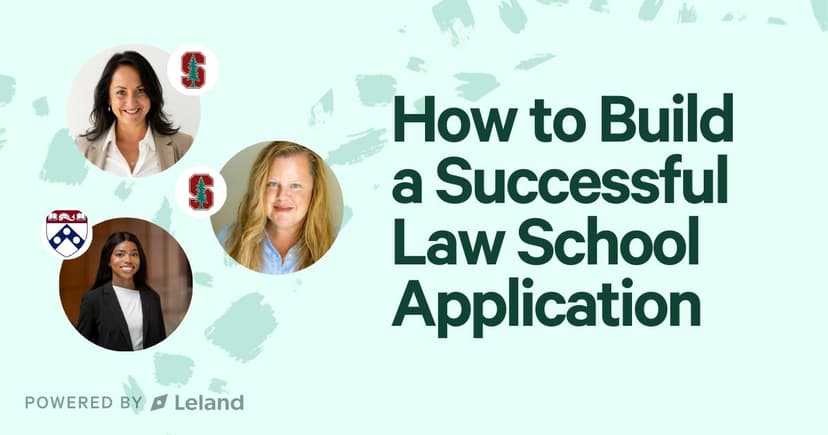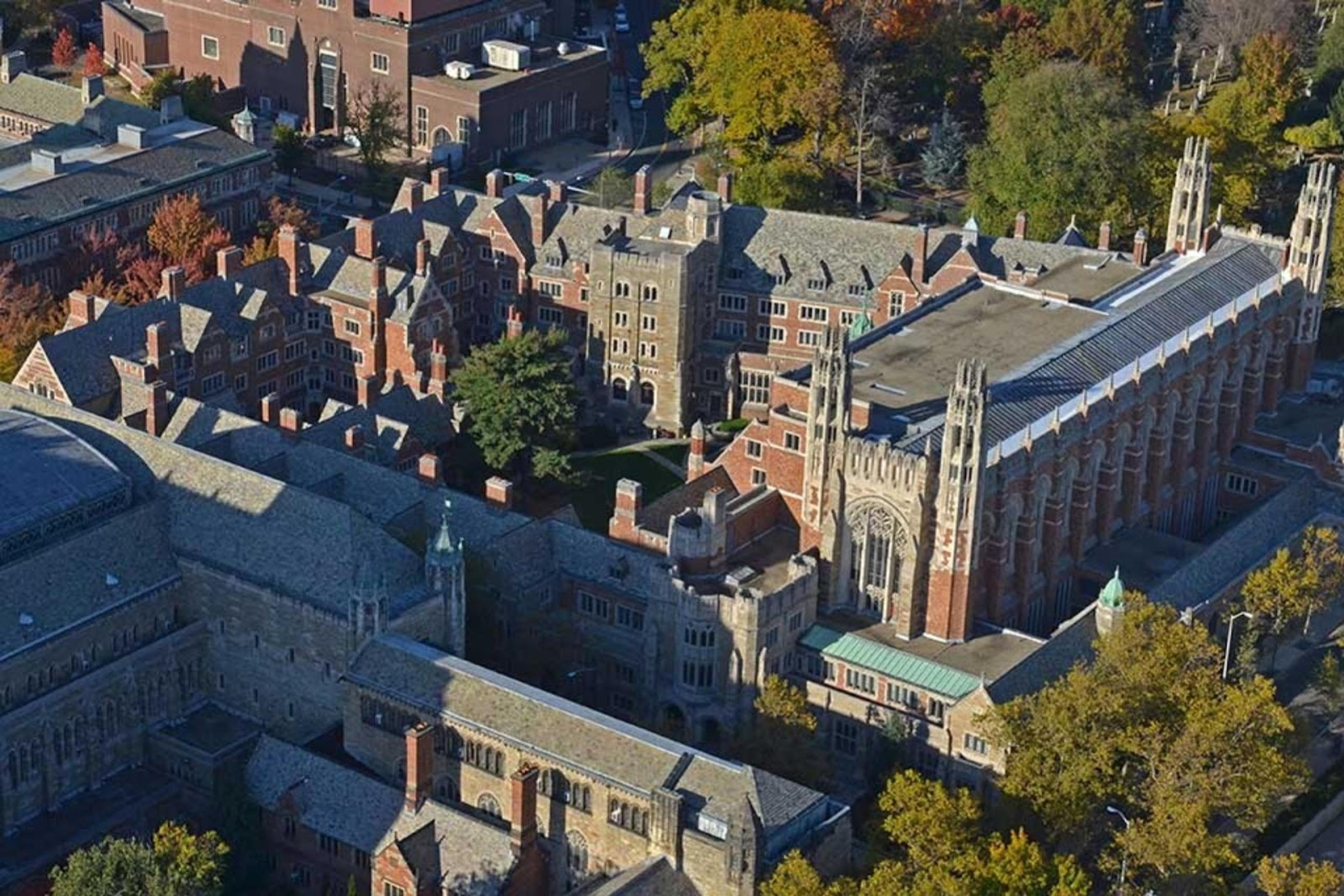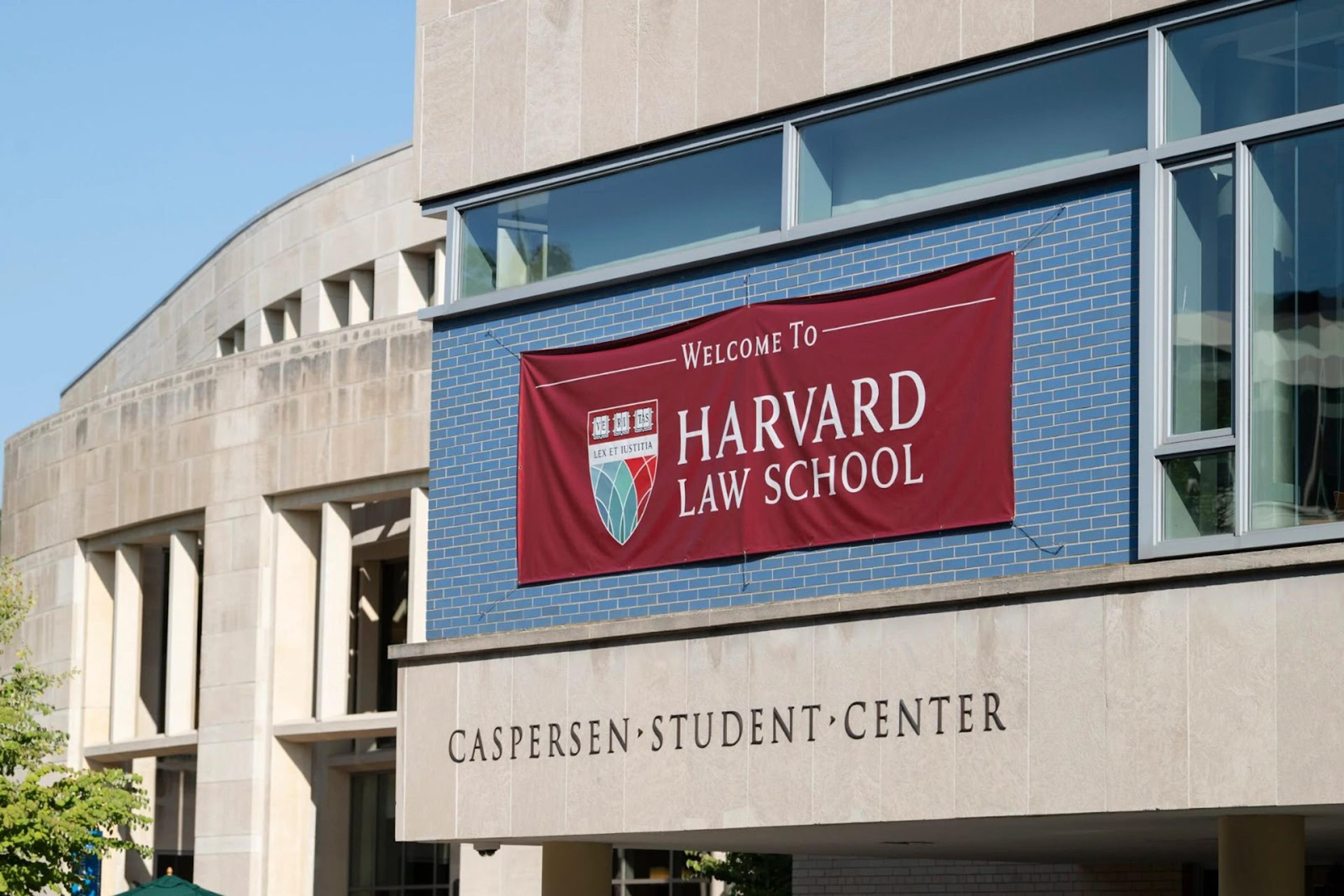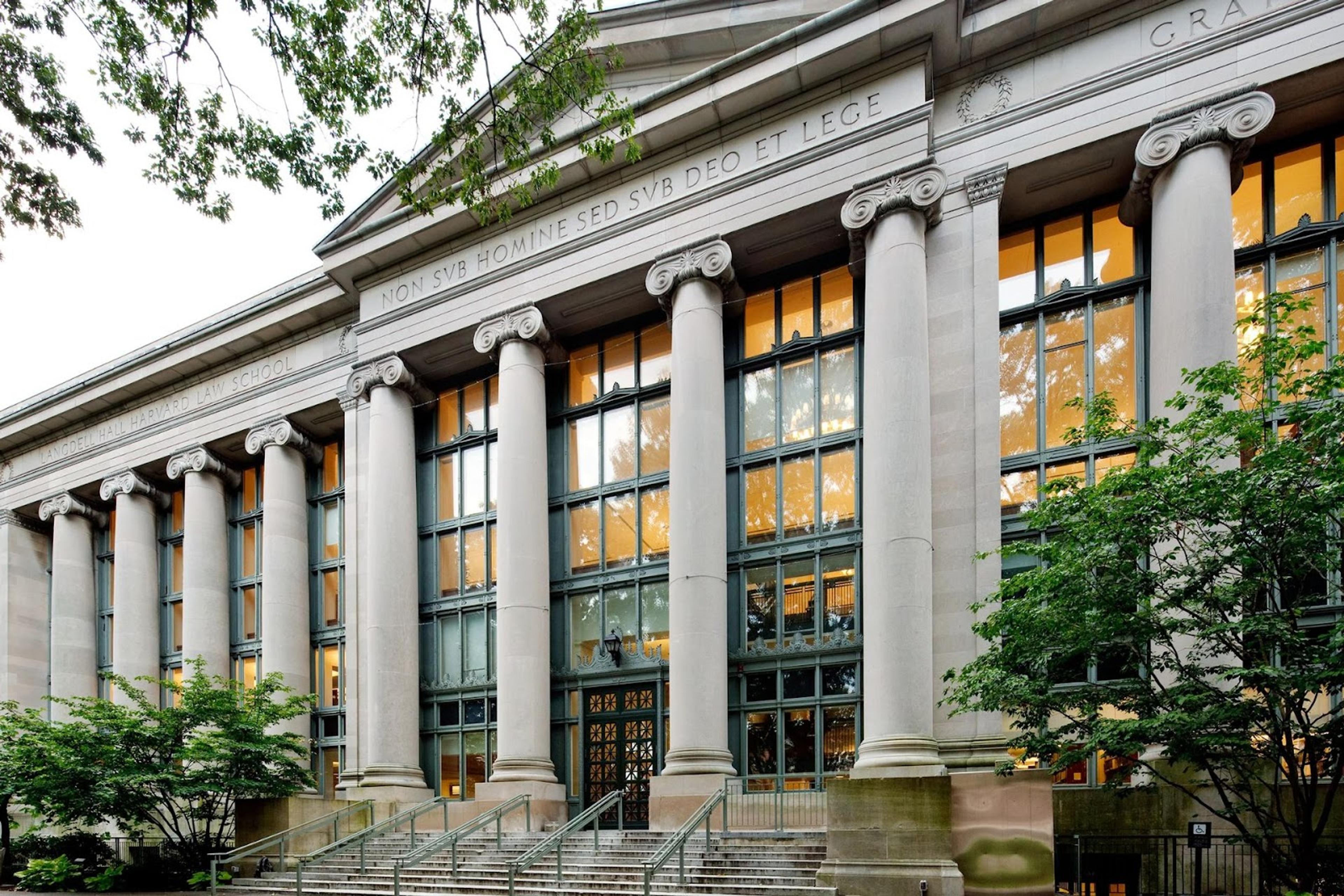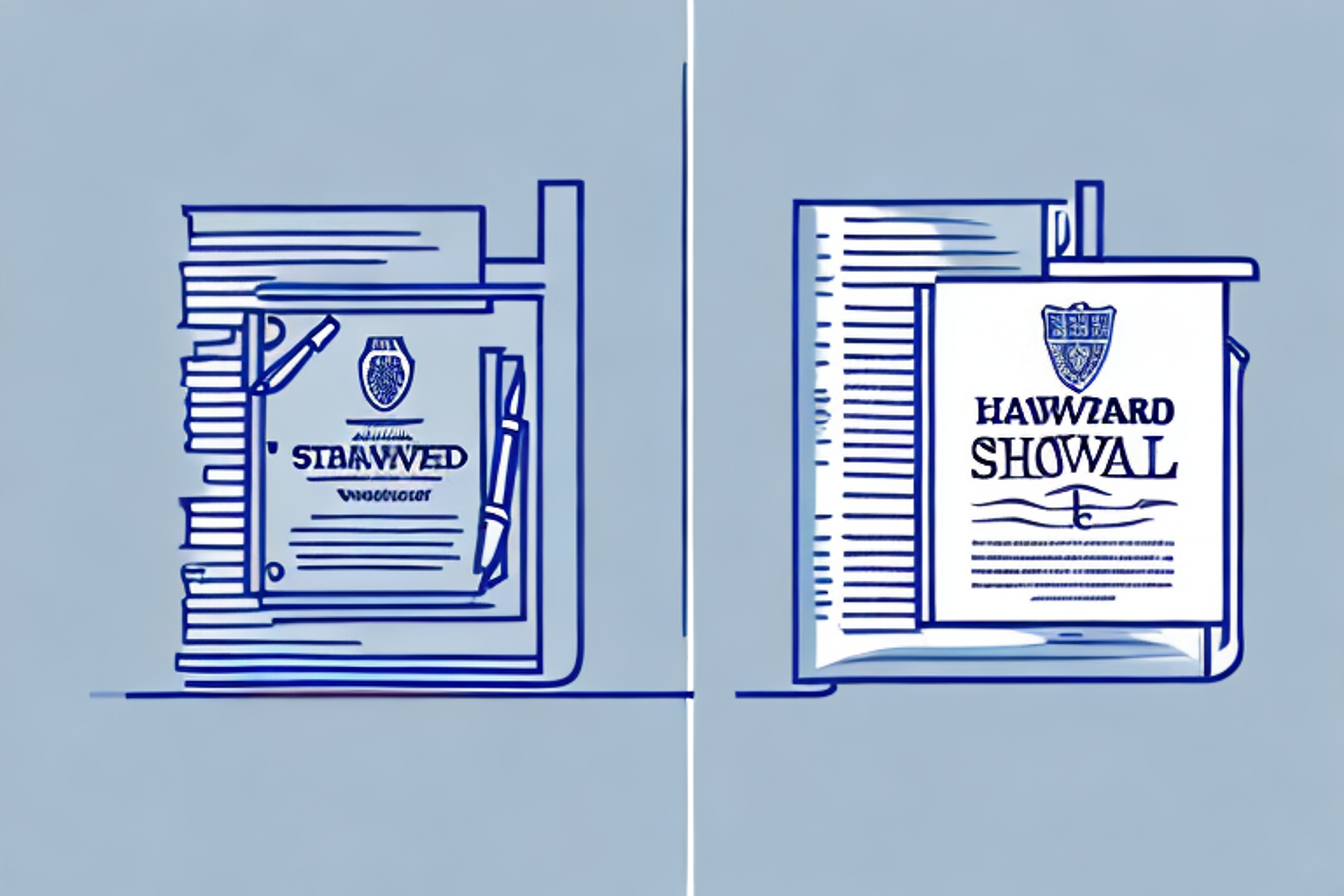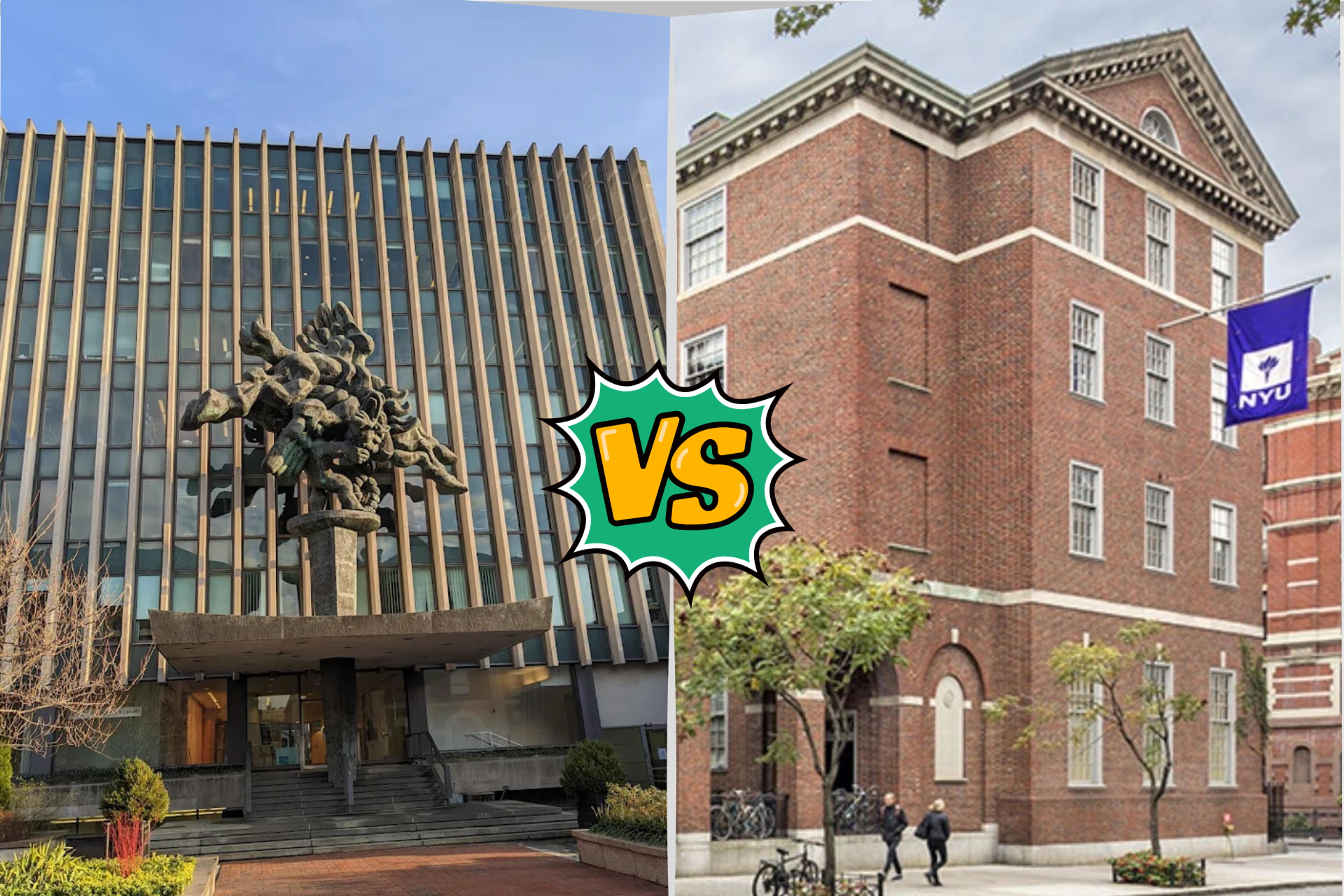Harvard Law School Vs. Yale Law School: An In-Depth Comparison
Discover the key differences between Harvard Law School and Yale Law School in this comprehensive comparison article.
Posted June 13, 2025
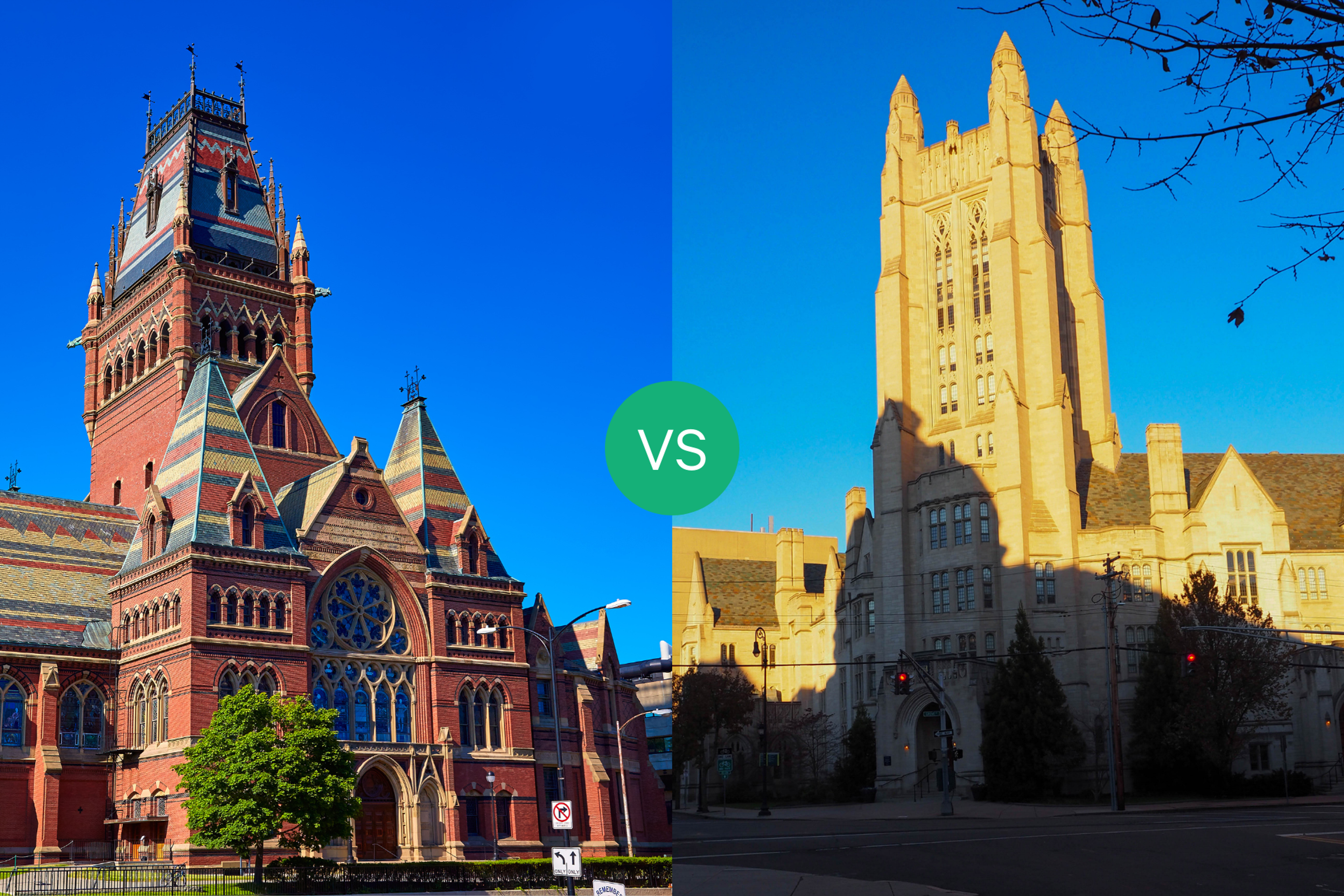
Join a free event
Learn from top coaches and industry experts in live, interactive sessions you can join for free.
Table of Contents
Harvard and Yale, two of the most prestigious Ivy League institutions, have long competed for the top spot as the best law school. If you're considering a legal education, you're likely aware that both schools offer compelling reasons to be considered a top choice. Known for their vibrant learning environments and distinguished faculties, Harvard and Yale each bring unique strengths to the table. In this article, we will explore their histories, curricula, admissions processes, student life, and job prospects to help you determine which school might be the best fit for you.
What Are the Tier 1 Law Schools?
Harvard and Yale are both considered ‘tier 1’ law schools – before we delve into our comparison, let’s first clarify what this means. These institutions are at the pinnacle of legal education, renowned for their academic rigor, esteemed faculty, extensive resources, and excellent post-graduation prospects. While the specific schools included in Tier 1 can vary based on different ranking systems and criteria, they generally share these traits of excellence.
Notable examples typically include:
- Yale Law School
- Harvard Law School
- Stanford Law School
- Columbia Law School
- University of Chicago Law School
- New York University School of Law
- University of California, Berkeley Law School
- University of Pennsylvania Law School
- University of Virginia Law School
- University of Michigan, Ann Arbor Law School
Harvard Law School and Yale Law School consistently rank highly among these elite institutions, which speaks volumes about their academic standards and selectivity. Admission to all tier 1 schools is highly competitive, with each accepting only a small fraction of applicants annually.
Moreover, Tier 1 law schools are distinguished not just by their rigorous academics but also by their formidable faculty and alumni networks. These schools have produced a plethora of Supreme Court justices, influential politicians, and leaders in the business world. Their faculties are leaders in legal research and scholarship, contributing significantly to the field. Both schools also offer abundant opportunities for practical learning through clinics, internships, and externships, providing students with invaluable experiences that pave the way for successful legal careers.
Not every aspiring lawyer needs to target tier 1 law schools – the right law school for each applicant depends on a plethora of personal factors like location, career goals, background, experience, GPA, test scores, price, and more. If tier 1 is your goal, and Harvard and Yale in particular, it’s important to understand each school so you can make the case for why you belong at these specific schools.
Harvard vs. Yale: Background and History
Harvard Law School
Founded in 1817, Harvard Law School (HLS) is one of the oldest and most prestigious law schools in the United States. On September 5, 2017, a notable discussion panel of HLS faculty members, led by Visiting Professor Daniel R. Coquillette, explored the school's early challenges. Coquillette highlighted how HLS faced potential failure twice within its first fifty years, saved each time by "people of great vision and genuinely radical ideas" that transformed legal education from its traditional apprenticeship model.
The seminal moment for HLS came on June 12, 1817, with the approval to establish a professional law school within Harvard University, thanks largely to the vision of Isaac Parker, the school’s first faculty member. Over the years, the steadfast support and philanthropy of its alumni have played a crucial role in maintaining HLS's reputation as a beacon of legal education, allowing it to continue innovating and inspiring future legal minds.
Today, Harvard Law School is renowned for its commitment to public service. It offers extensive opportunities for students to engage in pro bono work and community service, focusing on civil rights, environmental law, and international human rights. Many graduates pursue careers in public service, becoming judges, government officials, and advocates for social justice.
Yale Law School
The origins of Yale Law School can be traced back to the early 19th century in New Haven, Connecticut, under the auspices of Seth Staples. Staples, renowned for his substantial legal library, began educating apprentices in his law office, addressing the era's scarcity of accessible legal texts. By the 1810s, this informal training had formalized into a dedicated law school, with Samuel Hitchcock, a former apprentice of Staples, taking on a pivotal role in its development.
Yale Law School is also among the top law schools in the United States, known for producing prominent alumni, including U.S. Presidents and Supreme Court Justices. It is celebrated for its small class sizes and strong emphasis on public interest law.
In recent years, Yale Law has been a leader in fostering diversity and inclusion within the legal profession. The school has implemented numerous initiatives to enhance the representation of underrepresented groups among its students and faculty. Moreover, it encourages a strong commitment to pro bono work and public service, with many of its graduates working in public interest law and advocacy.
Yale Law has consistently adapted its curriculum to meet the changing demands of both public and private law, particularly as the role of legal professionals expanded through the 20th century. It became a hub for learning in areas such as constitutional law, taxation, and international law from the 1950s and 1960s onward. Today, the school continues to update its offerings, adding courses in comparative constitutional law, corporate finance, environmental law, and gender studies, among others. Its dedication to excellence is evident in its dynamic, hands-on programs, guided by dedicated faculty, ensuring that Yale Law remains at the forefront of legal education.
Admissions Process and Application Overview
Admission to both Harvard Law School and Yale Law School is highly competitive. Both schools receive thousands of applications each year, but only admit a small percentage of applicants. The admissions process for both schools includes submitting undergraduate transcripts, LSAT scores, essays, and letters of recommendation. However, there are some differences between the two schools' admissions processes. Let’s break down the admission process of each school, from their admission timeline to their application requirements.
Harvard Law School Deadlines and Decision Dates
- Application Deadline: February 15, 2024
- Decision Release: January 2024
- Acceptance Rate: 9.5% (J.D. Class of 2026)
Harvard Law Application Requirements
- Application Fee: The application fee for Harvard Law School is $85 (non-refundable), payable by credit card upon submission or via check or money order if preferred.
- Standardized Test Score: All J.D. program applicants are required to take either the Law School Admission Test (LSAT) or the Graduate Record Examinations (GRE) General Test, with both exams needing to be completed by the application deadline of February 15th.
Read: LSAT vs. GRE for Law School: Which You Should Take and How to Ace Both
- Official Transcripts: After registering for LSAC’s Credential Assembly Service (CAS), applicants are required to have all undergraduate and graduate transcripts sent to LSAC.
- Letters of Recommendation: Two letters of recommendation are required for the J.D. program, but HLS allows applicants to submit up to three. HLS strongly recommends that at least one letter of recommendation come from an academic source.
- Resume: HLS requires a 1 to 2-page resume for this program.
- Interview: The Admissions Office will reach out to you directly to set up the interview. The date of the interview will happen throughout the admission process, starting November 1.
- Personal/Written Statements: Each applicant must provide both a Statement of Purpose and a Statement of Perspective, with each statement required to be:
- One to two pages long
- Double-spaced, with one-inch margins
- Using a font size no smaller than 11 point
Note: Every applicant must respond to the following prompts:
- Statement of Purpose: What motivates you to pursue law? How does attending law school align with your ambitions, goals, and vision for your future?
- Statement of Perspective: The Admissions Committee makes every effort to understand who you are as an individual and potential Harvard Law School student and graduate. Please share how your experiences, background, and/or interests have shaped you and will shape your engagement in the HLS community and the legal profession.
- Additional Information: Feel free to share any relevant details that could assist the HLS in evaluating your candidacy, and if necessary, you can include a short addendum to supplement the application questions and required materials.
Visit Harvard Law School’s official website to learn more about their J.D. application requirements.
Yale Law School Deadlines and Decision Dates
- Start of Application: September 1, 2023
- Start of Application Submission: October 1, 2023
- Application Deadline: February 15, 2024
Yale Law Application Requirements
- Application Fee: The application fee for Yale Law School is $85 (non-refundable), although it can be waived automatically for applicants who have received LSAC fee waiver.
- Undergraduate Degrees & Academic Transcripts: To be eligible for application, it is important for applicants to submit transcripts from every college or university they have attended, including graduate or professional schools, directly to LSAC.
- Personal Statements: Applicants are required to submit a personal statement (two double-spaced pages) containing their personal, professional, and academic qualities that would bring to Yale Law School’s community.
- 250-Word Essays: Yale Law School requires its applicants to write and submit an essay of no more than 250 words about an idea from their academic, extracurricular, or professional work that piques their interest. The topic does not necessarily have to be law-related.
- Optional Essay: Applicants have the option to respond to one of Yale Law School's four essay prompts, each centered on a key value of the community, offering insights not covered elsewhere. Focus your essay on personal, professional, or academic experiences rather than reasons for choosing Yale Law School.
- Addenda: Applicants can include addenda if needed for the application, addressing issues like transcript or test score discrepancies, but it's not mandatory, and many applicants choose not to include any.
- Letters of Recommendation: Yale Law School requires at least two letters of recommendation from at least two former professors who can speak to your academic performance.
- Activities Sections: Yale Law School requires its applicants to submit a statement of activities regarding the applicant’s journey during their undergraduate education or after graduation (if applicable).
- Standardized Tests: Yale Law School accepts test results from either the following:
- LSAT
- GRE
- LSAT-Flex
- GRE General Test at Home
- Dean’s Certification: Yale Law School does not initially require dean's certification forms; however, if you're admitted and accept the offer, you'll need to provide them from all colleges or universities attended, irrespective of degree completion.
- Interview Program: Yale Law School will continue its interview pilot program started in the 2022-2023 cycle, selecting a few applicants for interviews without penalizing those who aren't chosen.
Visit Yale Law School’s official website to learn more about their J.D. application requirements.
Class Profile: Harvard Law School & Yale Law School
Harvard Law School Class of 2026 Class Profile
- Applicants: 8,393
- Offers of Admission: 798
- Accepted: 561
- Average LSAT Score: 174
- Average GPA: 3.93
- Women: 51%
- First-Generation Students: 14%
- People of Color: 51%
Yale Law School Class of 2026 Class Profile
- Applicants: 4,471
- Offers of Admission: 246
- Accepted: 213
- Average Age: 25
- Average LSAT Score: 175
- Average GPA: 3.96
- Women: 51%
- First-Generation Students: 18%
- People of Color: 57%
Curriculum Comparison: HLS vs. YLS
Both Harvard Law School and Yale Law School have rigorous academic curricula that are designed to prepare students for successful careers in law. Both schools offer a wide range of courses in other areas of law, such as constitutional law, criminal law, and international law.
Harvard Law School Curriculum
Harvard Law School offers 500+ courses for the 2024-2025 academic term.
First-Year Curriculum
HLS divides its first-year matriculants into seven sections of 80 students, each with a faculty leader. The HLS first-year curriculum courses are:
- Civil Procedure
- Constitutional Law
- Contracts
- Criminal Law
- January Experiential Term
- Legal Research and Writing
- Legislation and Regulation
- Property
- Torts
- One upper-level elective during 1L Spring term
Read more about the HLS 1L curriculum here.
Upper-Level Curriculum
HLS offers 500+ courses within their upper-level curriculum which also includes clinics, reading groups, and seminars (averaging 22 students per seminar). Through the upper-level curriculum, HLS also provides seven optional programs that can give guidance to their law students – giving them more exposure to the law, policy, theory, and practice in their chosen areas of focus. The seven optional programs of study are:
- Criminal Justice
- International and Comparative Law
- Law and Business
- Law and Government
- Law and History
- Law and Social Change
- Law, Science, and Technology
Yale Law School Curriculum
Yale Law School offers 200+ courses for the Spring of 2024.
The YLS offers twelve areas of study for each student to choose from depending on their interests. Each area provides courses, programs, clinics, experiential learning, fellowships, and more. The twelve areas include:
- Constitutional Law
- Corporate & Commercial Law
- Criminal Justice
- Environmental Law
- Human Rights Law
- International Law
- IT & Media Law
- Law & Economics
- Law & Health
- Law Teaching
- Legal History
- Public Interest Law
Harvard Law School offers a wider range of areas of study, allowing law students to experience more educational privileges such as clinical programs, where they can gain hands-on experience working with real clients under the supervision of experienced attorneys. Yale Law School also offers clinical programs, but places a greater emphasis on externships and field placements, where students can work with judges, government agencies, and non-profit organizations. Both schools also offer opportunities for students to participate in moot court competitions, where they can hone their oral advocacy skills and argue simulated cases before judges and attorneys.
Student Life and Extracurriculars
Both Harvard Law School and Yale Law School have vibrant student communities. Students at both schools are involved in a wide range of extracurricular activities, including law journals, moot court competitions, and student organizations. The student body at Harvard Law School is larger than the student body at Yale Law School, which may affect the overall campus culture.
Student Life at Harvard Law School
Harvard Law School has over 100 student organizations, world-class libraries, acclaimed cultural institutions, and a vibrant community of diverse and committed peers. With access to such resources, students can immerse themselves in a rich culture of legal interests, hobbies, identity groups, community service endeavors, and advocacy initiatives.
HLS’ support system for students includes:
- Inclusion and Belonging Office
- Advising and Mentorship Opportunities
- Health and Wellbeing Services
- Student Services Offices
There are also tons of student-led organizations and journals to find communities while at school. Browse them here:
Student Life at Yale Law School
Yale Law School students are prominent leaders both on campus and within the wider community, actively participating in numerous student organizations and serving as editors for the school's journals. Beyond academic pursuits, they are also committed to prioritizing equity, inclusion, and belonging within the Yale Law School community.
Yale Law School pride themselves on helping their students thrive in every aspect of their academic journey. YLS offers extensive support resources and services such as:
- Housing & Dining
- Safety & Security
- Information Technology Services (ITS)
- Students with Families
- Students with Disabilities
- International Students
- University Resources
YLS boasts more than 50 student organizations, 8 publications, and 17 student affinity groups. Check them out here:
Job Prospects and Career Opportunities
Both Harvard Law School and Yale Law School have excellent job placement rates for graduates. Graduates from both schools go on to have successful careers in law, business, politics, and academia. However, there are some differences between the two schools when it comes to job prospects. For example, graduates from Yale Law School tend to go into public interest law more often than graduates from Harvard Law School.
HLS vs. YLS: Employment Data Side-by-Side Comparison
Employment Status
- Employed - Bar Passage Required
- HLS - 554
- YLS - 174
- Employed - J.D. Advantage
- HLS - 516
- YLS - 9
- Employed - Professional Position
- HLS - 10
- YLS - 2
- Employed - Law School/University Funded
- HLS - 19
- YLS - 23
Total Graduates:
- HLS - 570
- YLS - 224
Employment Type
- Law Firms
- HLS - 372
- YLS - N/A
- Business & Industry
- HLS - 13
- YLS - 3
- Government
- HLS - 22
- YLS - 16
- Public Interest
- HLS - 57
- YLS - 38
- Judicial Clerkship
- HLS - 86
- YLS - 59
- Education
- HLS - 4
- YLS - 8
Total
- HLS - 554
- YLS - 208
Employment Location
- New York
- HLS - 193
- YLS - 61
- District of Columbia
- HLS - 96
- YLS - 44
- California
- HLS - 75
- YLS - 20
- Employed in Foreign Countries
- HLS - 10
- YLS - 6
Visit this page to see more information about HLS Employment Data.
Visit this page to see more information about YLS Employment Data.
HLS vs. YLS: Which One is Right for You?
After examining both Harvard Law School and Yale Law School in-depth, it's clear that both schools offer excellent legal education and career prospects. However, there are some differences between the two schools that may make one a better fit for you than the other. If you're interested in public interest law, for example, you may want to consider Yale Law School. If you're interested in corporate law, Harvard Law School may be a better fit. Ultimately, the decision about which law school to attend is a personal one that requires careful consideration of your individual goals, interests, and needs.
Frequently Asked Questions
Which is the best law school: Harvard Law School or Yale Law School?
- Choosing the best law school between Harvard Law School and Yale Law School depends on various factors, including your career goals, preferred learning environment, and specific legal interests. Both institutions are consistently ranked as top law schools globally, offering exceptional education, resources, and networking opportunities.
How do Harvard Law School and Yale Law School compare in terms of rankings?
- Harvard Law School and Yale Law School frequently top the rankings of law schools worldwide. Typically, Yale Law School is ranked first, while Harvard Law School follows closely behind. Both are considered top law schools with prestigious reputations.
Is Yale or Harvard harder to get into?
- Both Harvard and Yale are highly selective Ivy League universities with low acceptance rates. Yale is slightly harder to get into, with a marginally lower acceptance rate. Both schools prefer to admit students with 4.0 GPAs and set high academic expectations.
How do career opportunities compare between Harvard Law School and Yale Law School?
- Graduates from both Harvard and Yale Law Schools have excellent career prospects, with many securing positions at top law firms, government agencies, and non-profit organizations. Yale graduates tend to have a higher percentage of clerking for federal judges, while Harvard graduates are slightly more represented in large law firms and corporate positions.
Who are some of the notable alumni of Harvard Law School and Yale Law School?
- Both Harvard and Yale have produced many influential and successful alumni. Notable Harvard Law School alumni include former U.S. Presidents Barack Obama and Rutherford B. Hayes, while Yale Law School counts former U.S. Presidents Bill Clinton and Gerald Ford among its graduates. Both schools' alumni networks are strong and influential in various fields.
Read these next:









